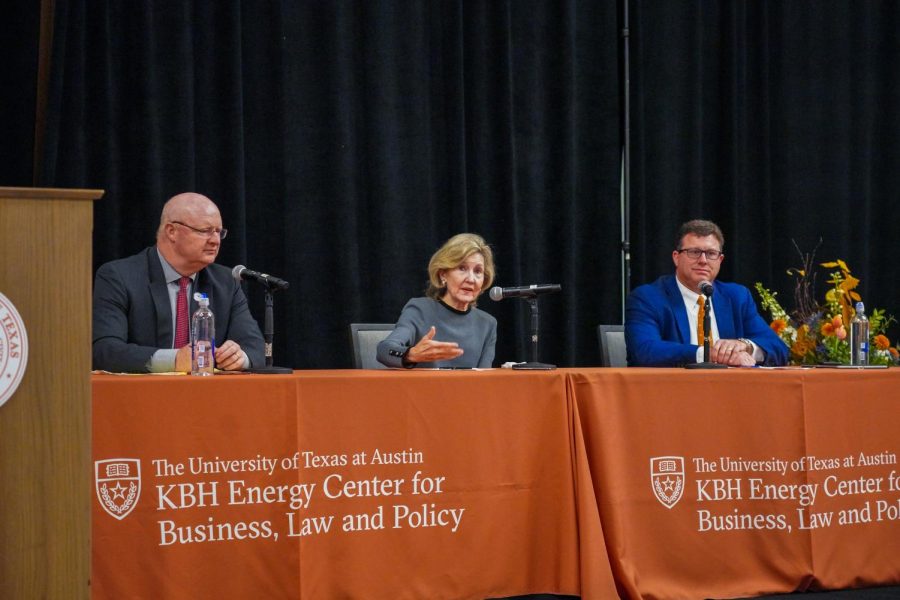Climate change, green energy take center stage at annual energy forum
November 7, 2022
UT faculty spoke alongside politicians, economists and energy executives Friday at the Kay Bailey Hutchison Energy Center’s seventh annual symposium.
Eighteen panelists came together at the AT&T Hotel and Conference Center to discuss the roles that fossil fuels and clean and renewable energies will play in the future. Although panelists disagreed on some of these roles, they held the common consensus that fossil fuels won’t be going away.
“We export some eight million barrels (of oil) per day supporting our allies around the world, strengthening our national security (and) developing our domestic energy supply,” said Kevin Brady, United States congressman for Texas’ District 8.
Prior to 2019, the U.S. hadn’t been a net exporter of energy since 1952. Now, the country exports over 25 quadrillion British thermal units of energy in natural gas, coal and other fossil fuels.
Brady said these industries play a key role in the economy, having created over 50,000 jobs in 2019. However, he also said he hopes scientists develop and expand green energy for the sake of the environment.
“We have a very real and very smart energy innovation sector whose innovations are going to keep energy affordable, but (also) clean the air and the environment,” Brady said. “A smarter way of tackling climate change is not to drive energy prices higher, but to make affordable energy cleaner.”
Marshall Adkins, former director of energy research for Raymond James Financial, said he believes electric vehicles will not play a major role in reducing greenhouse gas emissions.
According to Adkins, electric vehicles will only comprise 10% of all transportation by 2030. He said hydrocarbons, the compound of fossil fuels that emits energy, have not been reduced significantly as a result of electric vehicles, with the compound currently producing 82% of transportation energy compared to 86% 20 years ago.
“You are not going to get rid of hydrocarbons in our lifetime,” Adkins said. “It’s just not possible based on the physics of both the green energy and hydrocarbons as we know them today.”
James Glotfelty, commissioner of the Public Utility Commission of Texas, said he is concerned about power grid innovations not keeping up with the switch to electric vehicles, but according to Climate Nexus, the shift to electric vehicles will not have any adverse effects on U.S. power grids.
“I’ve heard stories where if you are the last (electric vehicle) on your block, … your (electric vehicle) may not charge as quick as you expect,” Glotfelty said. “We need to invest in our distribution systems and ensure that that technology works the way it’s supposed to.”
Scott Tinker, director of UT’s Bureau of Economic Geology, said he hopes nuclear energy plays a bigger role in the future, though criticized how it is currently approached; there is only one set of nuclear reactors under construction in the U.S.
According to Fox Business, the construction site was supposed to be operational by 2016 but has been delayed to 2023 after going $15 billion over budget.
Despite this, Tinker said he hopes nuclear energy is effectively developed as a means to fight climate change.
“(Younger generations) haven’t been trained to be scared of (nuclear energy) yet. … We were all trained to be scared of it under (our) desks in kindergarten,” Tinker said. “You can be really passionate about climate change, and you can be passionately opposed to nuclear, but you can’t be both.”










